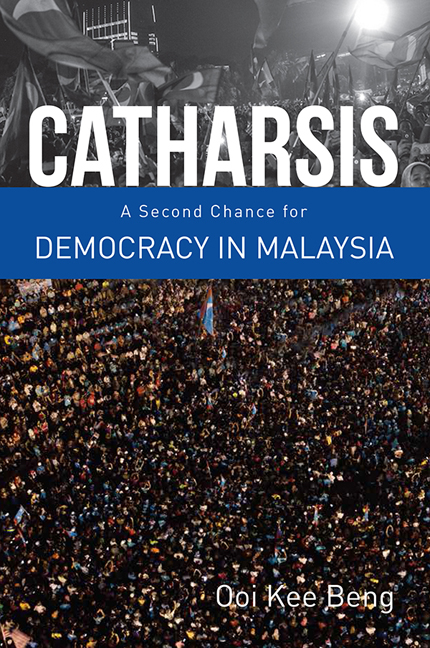Book contents
- Frontmatter
- Contents
- Foreword
- 1 Introduction – Malaysia's Future Is Redeemed
- Before Pakatan Harapan
- Before 9 May 2018
- With Mahathir at the Helm
- Beyond 9 May 2018
- 47 The Bewildering Game of Malaysian Politics, the Rot Within the Barisan Nasional
- 48 A Revolution in Malaysia? Not So Fast…
- 49 Mahathir: Renaissance Man
- 50 Malaysia's Reformasi Movement Lives Up To Its Name
- 51 In Lieu of Race and Religion
- 52 It All Seems So Simple Now…
- 53 Catharsis – The Rebirth of Malaysia Finally Begins
- 54 A Malaysian Spring for Intelligentsia?
- 55 The Layers of Historical Significance of GE14
- About the Author
54 - A Malaysian Spring for Intelligentsia?
from Beyond 9 May 2018
Published online by Cambridge University Press: 12 February 2019
- Frontmatter
- Contents
- Foreword
- 1 Introduction – Malaysia's Future Is Redeemed
- Before Pakatan Harapan
- Before 9 May 2018
- With Mahathir at the Helm
- Beyond 9 May 2018
- 47 The Bewildering Game of Malaysian Politics, the Rot Within the Barisan Nasional
- 48 A Revolution in Malaysia? Not So Fast…
- 49 Mahathir: Renaissance Man
- 50 Malaysia's Reformasi Movement Lives Up To Its Name
- 51 In Lieu of Race and Religion
- 52 It All Seems So Simple Now…
- 53 Catharsis – The Rebirth of Malaysia Finally Begins
- 54 A Malaysian Spring for Intelligentsia?
- 55 The Layers of Historical Significance of GE14
- About the Author
Summary
I know Malaysia is a tropical country, but let's adopt a concept from temperate zones without having to be politically sensitive about it. We are in the midst of a potent Malaysian Spring, and the way things are looking, a proper summer is to be expected. And by the time winter comes along many months down the road, we will all be — or on the way to being — properly nourished, physically safe and pleasantly housed.
In my experience, spring signals the arrival of an overpowering sense of hope. In Sweden, they call it “vårkänsla” — the feel of spring during which the need for all living beings to create and procreate, and to rejoice, is in painful excess.
Spring always makes the self-piteousness of the winter seem pathetic and irrelevant. And yet, the negation of the reasons for dark depression does not mean that the reasons for hope will naturally bear fruit. Even if the proverbial spring is a gift, the approaching summer is not. Instead, the summer has to be actively embraced; it is a time that calls for action if promise is to be fulfilled.
Freeing the Malaysian tongue
One sad long-term effect of the excessive control of free speech in Malaysia over the last few decades is that the culture of discussion and debate that we once enjoyed has been stifled. A new era may be beginning, but a new ethos of fearless yet responsible voicing of opinions will appear only if actively encouraged and cultivated, and by as many Malaysians as possible.
In an ideal country that is free and bold, public discourses would be stimulated by its universities and journalists. In the far-from-ideal country that Malaysia has been, where student life for decades was dissociated on pain of serious punishment from public expressions of interest in politics, the ability to engage in subtle and thoughtful discussions about such matters was naturally stunted. The Universities and University Colleges Act 1971 made sure of that.
For journalists, there exists a broader spectrum of legislation for their persecutors and prosecutors to choose from. If the Security Offences (Special Measures) Act 2012 that replaced the Internal Security Act 1960 did not suffice for some reason, then there was always the Sedition Act 1948.
- Type
- Chapter
- Information
- CatharsisA Second Chance for Democracy in Malaysia, pp. 215 - 217Publisher: ISEAS–Yusof Ishak InstitutePrint publication year: 2018



